Accounting Theory and Contemporary Issues: AI Impact Analysis
VerifiedAdded on 2020/05/16
|18
|4319
|43
Report
AI Summary
This report delves into the intersection of accounting theory and contemporary issues, specifically focusing on the impact of Artificial Intelligence (AI) on the accounting profession. It begins by outlining the report's objectives, audience, and the vital decisions related to AI adoption within an accounting firm. The report then explores the opportunities and threats associated with AI implementation, emphasizing its transformative effect on accountants' work and the efficiency gains it offers. The analysis includes a review of relevant sources, such as academic journals and research papers, evaluating the credentials of authors, the perspectives of audiences, and the key facts presented. The report highlights the ways in which technology, particularly AI, has reshaped accounting practices in recent decades, including the development of expert systems and automation. It discusses the evolution of AI, its various applications, and its impact on the accountant's role, providing recommendations for maximizing its benefits. The report concludes by summarizing the potential for AI to reduce errors, improve financial performance, and enhance accountants' abilities to assess statistical values, ultimately contributing to a more efficient and sustainable organizational structure. Finally, the report also provides the challenges for the artificial intelligence and technological advancements impact on different practices in accounting.
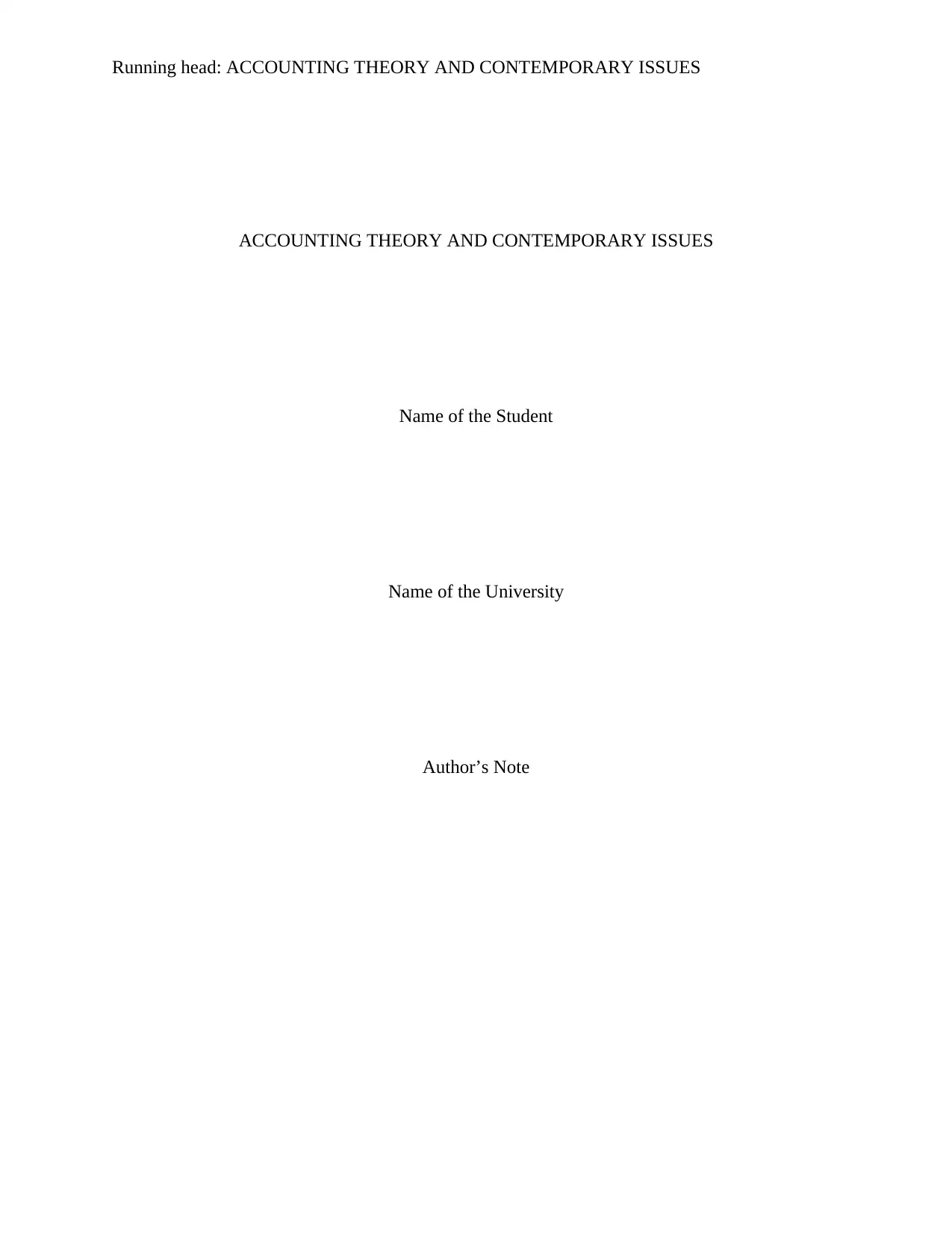
Running head: ACCOUNTING THEORY AND CONTEMPORARY ISSUES
ACCOUNTING THEORY AND CONTEMPORARY ISSUES
Name of the Student
Name of the University
Author’s Note
ACCOUNTING THEORY AND CONTEMPORARY ISSUES
Name of the Student
Name of the University
Author’s Note
Paraphrase This Document
Need a fresh take? Get an instant paraphrase of this document with our AI Paraphraser
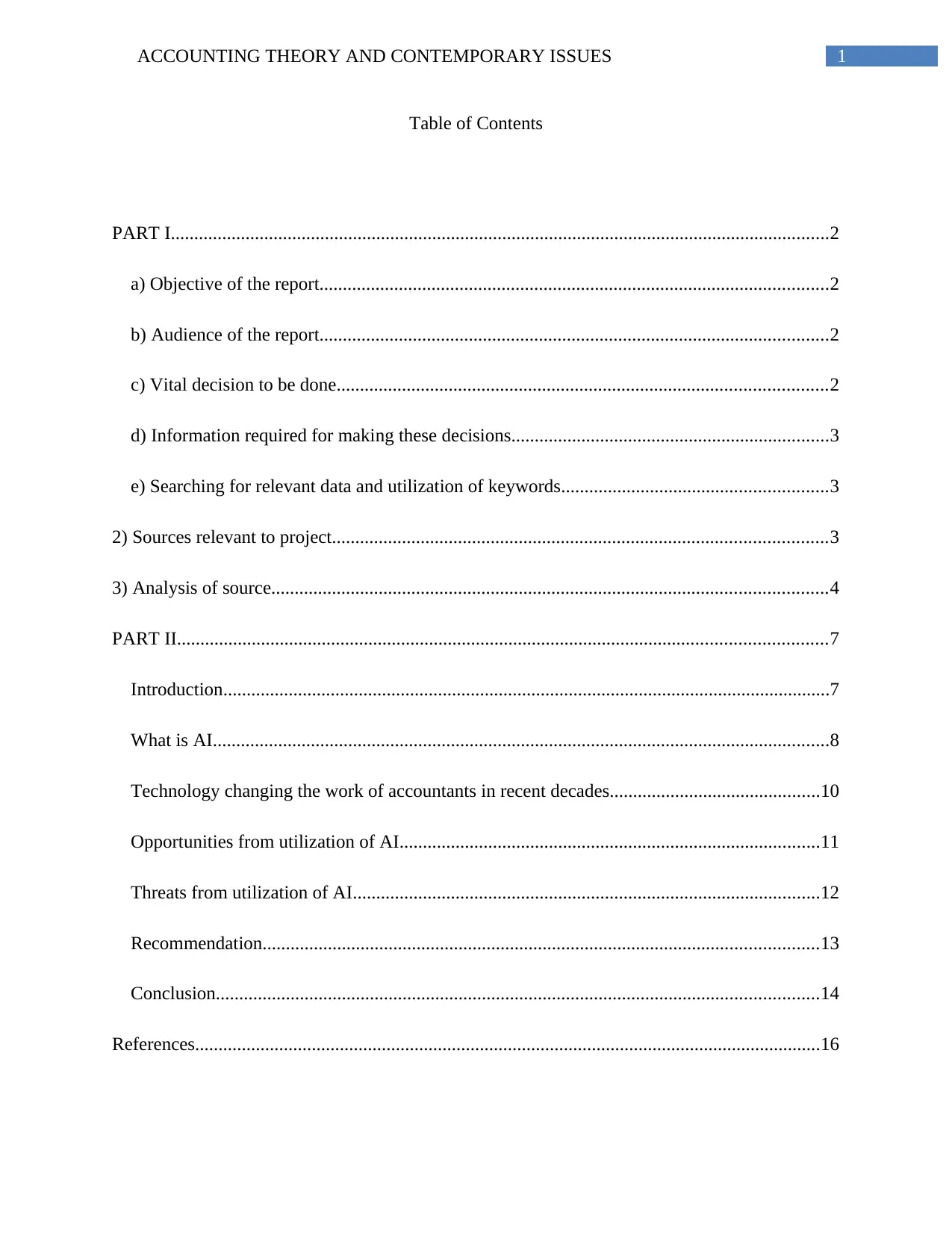
1ACCOUNTING THEORY AND CONTEMPORARY ISSUES
Table of Contents
PART I.............................................................................................................................................2
a) Objective of the report.............................................................................................................2
b) Audience of the report.............................................................................................................2
c) Vital decision to be done.........................................................................................................2
d) Information required for making these decisions....................................................................3
e) Searching for relevant data and utilization of keywords.........................................................3
2) Sources relevant to project..........................................................................................................3
3) Analysis of source.......................................................................................................................4
PART II...........................................................................................................................................7
Introduction..................................................................................................................................7
What is AI....................................................................................................................................8
Technology changing the work of accountants in recent decades.............................................10
Opportunities from utilization of AI..........................................................................................11
Threats from utilization of AI....................................................................................................12
Recommendation.......................................................................................................................13
Conclusion.................................................................................................................................14
References......................................................................................................................................16
Table of Contents
PART I.............................................................................................................................................2
a) Objective of the report.............................................................................................................2
b) Audience of the report.............................................................................................................2
c) Vital decision to be done.........................................................................................................2
d) Information required for making these decisions....................................................................3
e) Searching for relevant data and utilization of keywords.........................................................3
2) Sources relevant to project..........................................................................................................3
3) Analysis of source.......................................................................................................................4
PART II...........................................................................................................................................7
Introduction..................................................................................................................................7
What is AI....................................................................................................................................8
Technology changing the work of accountants in recent decades.............................................10
Opportunities from utilization of AI..........................................................................................11
Threats from utilization of AI....................................................................................................12
Recommendation.......................................................................................................................13
Conclusion.................................................................................................................................14
References......................................................................................................................................16
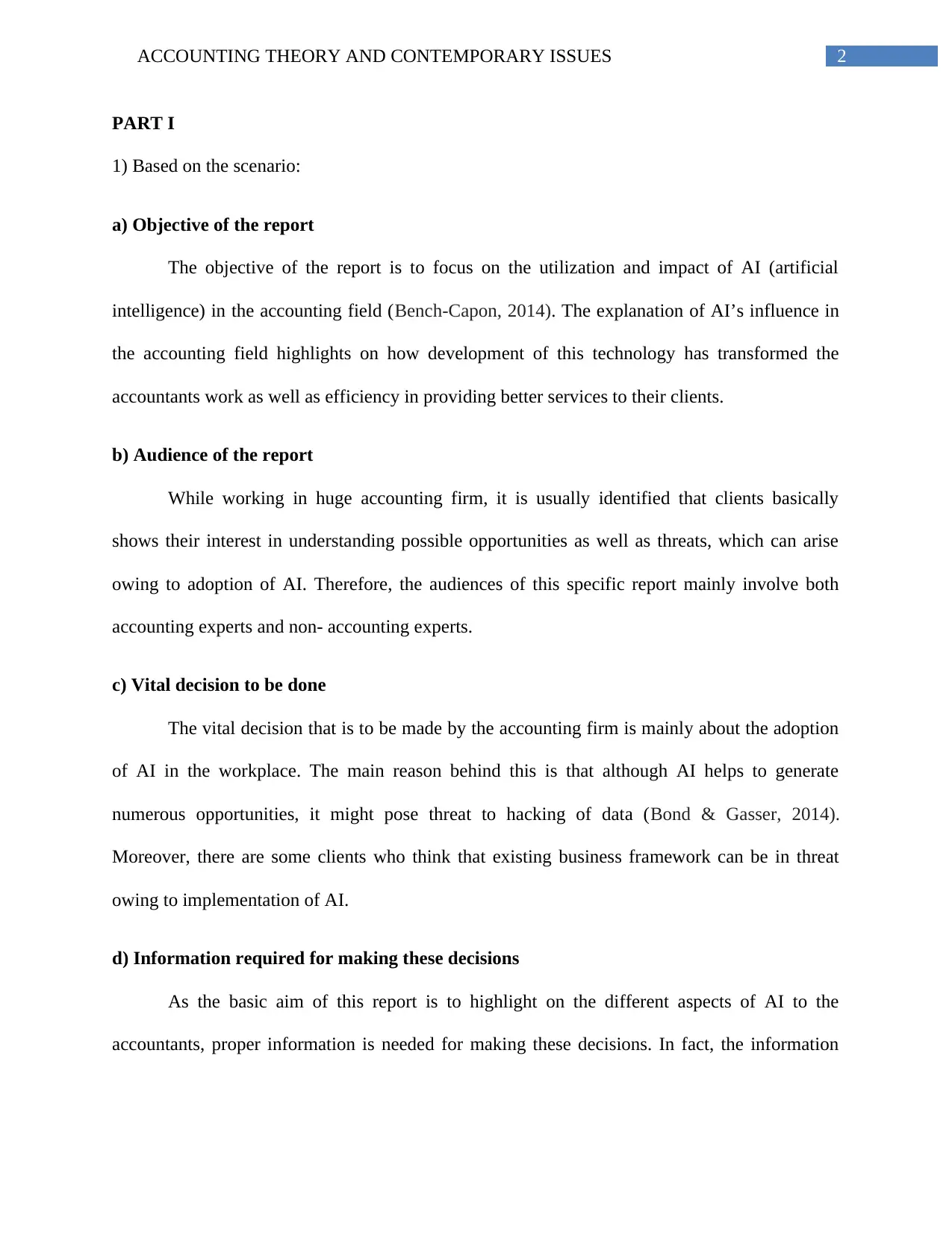
2ACCOUNTING THEORY AND CONTEMPORARY ISSUES
PART I
1) Based on the scenario:
a) Objective of the report
The objective of the report is to focus on the utilization and impact of AI (artificial
intelligence) in the accounting field (Bench-Capon, 2014). The explanation of AI’s influence in
the accounting field highlights on how development of this technology has transformed the
accountants work as well as efficiency in providing better services to their clients.
b) Audience of the report
While working in huge accounting firm, it is usually identified that clients basically
shows their interest in understanding possible opportunities as well as threats, which can arise
owing to adoption of AI. Therefore, the audiences of this specific report mainly involve both
accounting experts and non- accounting experts.
c) Vital decision to be done
The vital decision that is to be made by the accounting firm is mainly about the adoption
of AI in the workplace. The main reason behind this is that although AI helps to generate
numerous opportunities, it might pose threat to hacking of data (Bond & Gasser, 2014).
Moreover, there are some clients who think that existing business framework can be in threat
owing to implementation of AI.
d) Information required for making these decisions
As the basic aim of this report is to highlight on the different aspects of AI to the
accountants, proper information is needed for making these decisions. In fact, the information
PART I
1) Based on the scenario:
a) Objective of the report
The objective of the report is to focus on the utilization and impact of AI (artificial
intelligence) in the accounting field (Bench-Capon, 2014). The explanation of AI’s influence in
the accounting field highlights on how development of this technology has transformed the
accountants work as well as efficiency in providing better services to their clients.
b) Audience of the report
While working in huge accounting firm, it is usually identified that clients basically
shows their interest in understanding possible opportunities as well as threats, which can arise
owing to adoption of AI. Therefore, the audiences of this specific report mainly involve both
accounting experts and non- accounting experts.
c) Vital decision to be done
The vital decision that is to be made by the accounting firm is mainly about the adoption
of AI in the workplace. The main reason behind this is that although AI helps to generate
numerous opportunities, it might pose threat to hacking of data (Bond & Gasser, 2014).
Moreover, there are some clients who think that existing business framework can be in threat
owing to implementation of AI.
d) Information required for making these decisions
As the basic aim of this report is to highlight on the different aspects of AI to the
accountants, proper information is needed for making these decisions. In fact, the information
⊘ This is a preview!⊘
Do you want full access?
Subscribe today to unlock all pages.

Trusted by 1+ million students worldwide
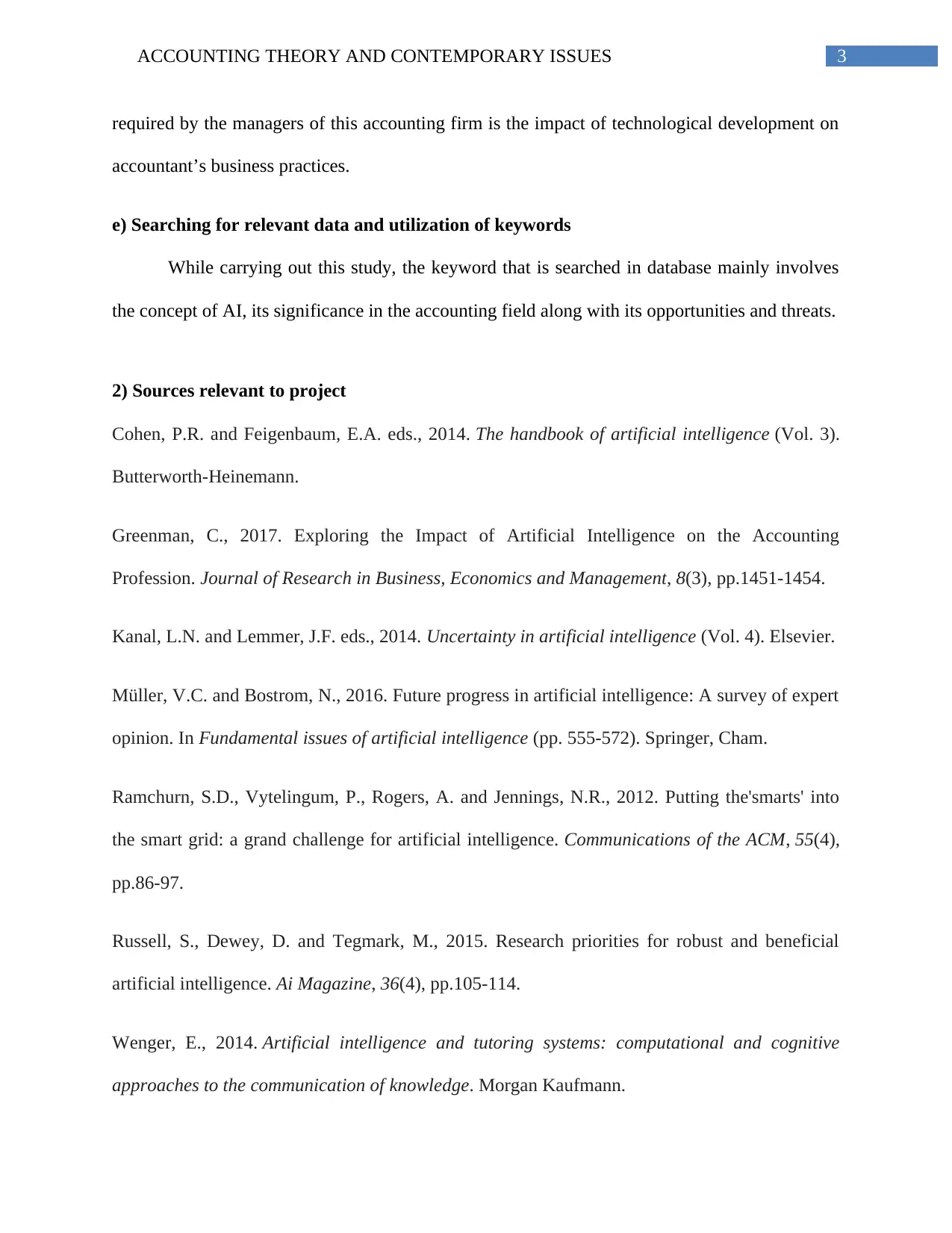
3ACCOUNTING THEORY AND CONTEMPORARY ISSUES
required by the managers of this accounting firm is the impact of technological development on
accountant’s business practices.
e) Searching for relevant data and utilization of keywords
While carrying out this study, the keyword that is searched in database mainly involves
the concept of AI, its significance in the accounting field along with its opportunities and threats.
2) Sources relevant to project
Cohen, P.R. and Feigenbaum, E.A. eds., 2014. The handbook of artificial intelligence (Vol. 3).
Butterworth-Heinemann.
Greenman, C., 2017. Exploring the Impact of Artificial Intelligence on the Accounting
Profession. Journal of Research in Business, Economics and Management, 8(3), pp.1451-1454.
Kanal, L.N. and Lemmer, J.F. eds., 2014. Uncertainty in artificial intelligence (Vol. 4). Elsevier.
Müller, V.C. and Bostrom, N., 2016. Future progress in artificial intelligence: A survey of expert
opinion. In Fundamental issues of artificial intelligence (pp. 555-572). Springer, Cham.
Ramchurn, S.D., Vytelingum, P., Rogers, A. and Jennings, N.R., 2012. Putting the'smarts' into
the smart grid: a grand challenge for artificial intelligence. Communications of the ACM, 55(4),
pp.86-97.
Russell, S., Dewey, D. and Tegmark, M., 2015. Research priorities for robust and beneficial
artificial intelligence. Ai Magazine, 36(4), pp.105-114.
Wenger, E., 2014. Artificial intelligence and tutoring systems: computational and cognitive
approaches to the communication of knowledge. Morgan Kaufmann.
required by the managers of this accounting firm is the impact of technological development on
accountant’s business practices.
e) Searching for relevant data and utilization of keywords
While carrying out this study, the keyword that is searched in database mainly involves
the concept of AI, its significance in the accounting field along with its opportunities and threats.
2) Sources relevant to project
Cohen, P.R. and Feigenbaum, E.A. eds., 2014. The handbook of artificial intelligence (Vol. 3).
Butterworth-Heinemann.
Greenman, C., 2017. Exploring the Impact of Artificial Intelligence on the Accounting
Profession. Journal of Research in Business, Economics and Management, 8(3), pp.1451-1454.
Kanal, L.N. and Lemmer, J.F. eds., 2014. Uncertainty in artificial intelligence (Vol. 4). Elsevier.
Müller, V.C. and Bostrom, N., 2016. Future progress in artificial intelligence: A survey of expert
opinion. In Fundamental issues of artificial intelligence (pp. 555-572). Springer, Cham.
Ramchurn, S.D., Vytelingum, P., Rogers, A. and Jennings, N.R., 2012. Putting the'smarts' into
the smart grid: a grand challenge for artificial intelligence. Communications of the ACM, 55(4),
pp.86-97.
Russell, S., Dewey, D. and Tegmark, M., 2015. Research priorities for robust and beneficial
artificial intelligence. Ai Magazine, 36(4), pp.105-114.
Wenger, E., 2014. Artificial intelligence and tutoring systems: computational and cognitive
approaches to the communication of knowledge. Morgan Kaufmann.
Paraphrase This Document
Need a fresh take? Get an instant paraphrase of this document with our AI Paraphraser
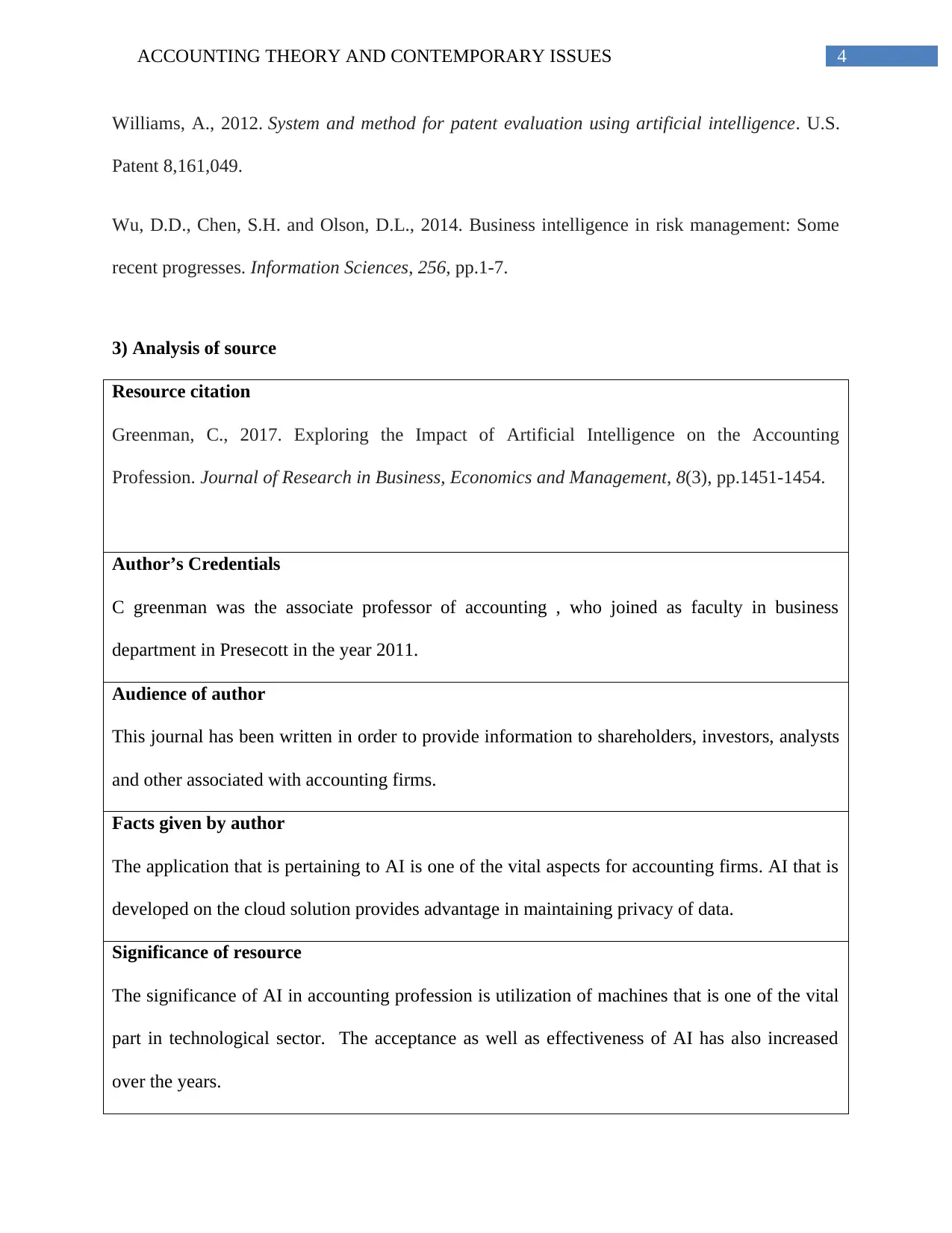
4ACCOUNTING THEORY AND CONTEMPORARY ISSUES
Williams, A., 2012. System and method for patent evaluation using artificial intelligence. U.S.
Patent 8,161,049.
Wu, D.D., Chen, S.H. and Olson, D.L., 2014. Business intelligence in risk management: Some
recent progresses. Information Sciences, 256, pp.1-7.
3) Analysis of source
Resource citation
Greenman, C., 2017. Exploring the Impact of Artificial Intelligence on the Accounting
Profession. Journal of Research in Business, Economics and Management, 8(3), pp.1451-1454.
Author’s Credentials
C greenman was the associate professor of accounting , who joined as faculty in business
department in Presecott in the year 2011.
Audience of author
This journal has been written in order to provide information to shareholders, investors, analysts
and other associated with accounting firms.
Facts given by author
The application that is pertaining to AI is one of the vital aspects for accounting firms. AI that is
developed on the cloud solution provides advantage in maintaining privacy of data.
Significance of resource
The significance of AI in accounting profession is utilization of machines that is one of the vital
part in technological sector. The acceptance as well as effectiveness of AI has also increased
over the years.
Williams, A., 2012. System and method for patent evaluation using artificial intelligence. U.S.
Patent 8,161,049.
Wu, D.D., Chen, S.H. and Olson, D.L., 2014. Business intelligence in risk management: Some
recent progresses. Information Sciences, 256, pp.1-7.
3) Analysis of source
Resource citation
Greenman, C., 2017. Exploring the Impact of Artificial Intelligence on the Accounting
Profession. Journal of Research in Business, Economics and Management, 8(3), pp.1451-1454.
Author’s Credentials
C greenman was the associate professor of accounting , who joined as faculty in business
department in Presecott in the year 2011.
Audience of author
This journal has been written in order to provide information to shareholders, investors, analysts
and other associated with accounting firms.
Facts given by author
The application that is pertaining to AI is one of the vital aspects for accounting firms. AI that is
developed on the cloud solution provides advantage in maintaining privacy of data.
Significance of resource
The significance of AI in accounting profession is utilization of machines that is one of the vital
part in technological sector. The acceptance as well as effectiveness of AI has also increased
over the years.
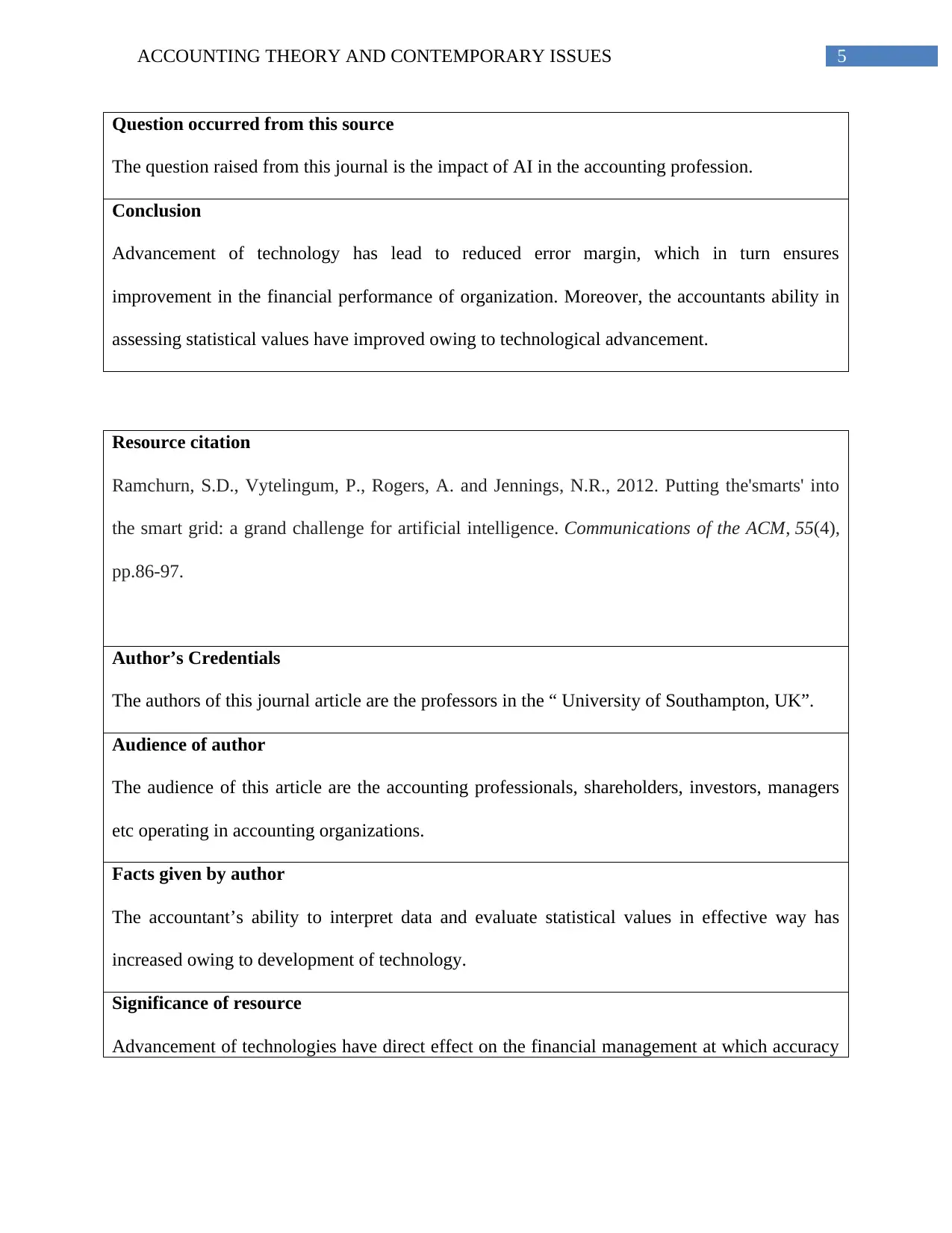
5ACCOUNTING THEORY AND CONTEMPORARY ISSUES
Question occurred from this source
The question raised from this journal is the impact of AI in the accounting profession.
Conclusion
Advancement of technology has lead to reduced error margin, which in turn ensures
improvement in the financial performance of organization. Moreover, the accountants ability in
assessing statistical values have improved owing to technological advancement.
Resource citation
Ramchurn, S.D., Vytelingum, P., Rogers, A. and Jennings, N.R., 2012. Putting the'smarts' into
the smart grid: a grand challenge for artificial intelligence. Communications of the ACM, 55(4),
pp.86-97.
Author’s Credentials
The authors of this journal article are the professors in the “ University of Southampton, UK”.
Audience of author
The audience of this article are the accounting professionals, shareholders, investors, managers
etc operating in accounting organizations.
Facts given by author
The accountant’s ability to interpret data and evaluate statistical values in effective way has
increased owing to development of technology.
Significance of resource
Advancement of technologies have direct effect on the financial management at which accuracy
Question occurred from this source
The question raised from this journal is the impact of AI in the accounting profession.
Conclusion
Advancement of technology has lead to reduced error margin, which in turn ensures
improvement in the financial performance of organization. Moreover, the accountants ability in
assessing statistical values have improved owing to technological advancement.
Resource citation
Ramchurn, S.D., Vytelingum, P., Rogers, A. and Jennings, N.R., 2012. Putting the'smarts' into
the smart grid: a grand challenge for artificial intelligence. Communications of the ACM, 55(4),
pp.86-97.
Author’s Credentials
The authors of this journal article are the professors in the “ University of Southampton, UK”.
Audience of author
The audience of this article are the accounting professionals, shareholders, investors, managers
etc operating in accounting organizations.
Facts given by author
The accountant’s ability to interpret data and evaluate statistical values in effective way has
increased owing to development of technology.
Significance of resource
Advancement of technologies have direct effect on the financial management at which accuracy
⊘ This is a preview!⊘
Do you want full access?
Subscribe today to unlock all pages.

Trusted by 1+ million students worldwide
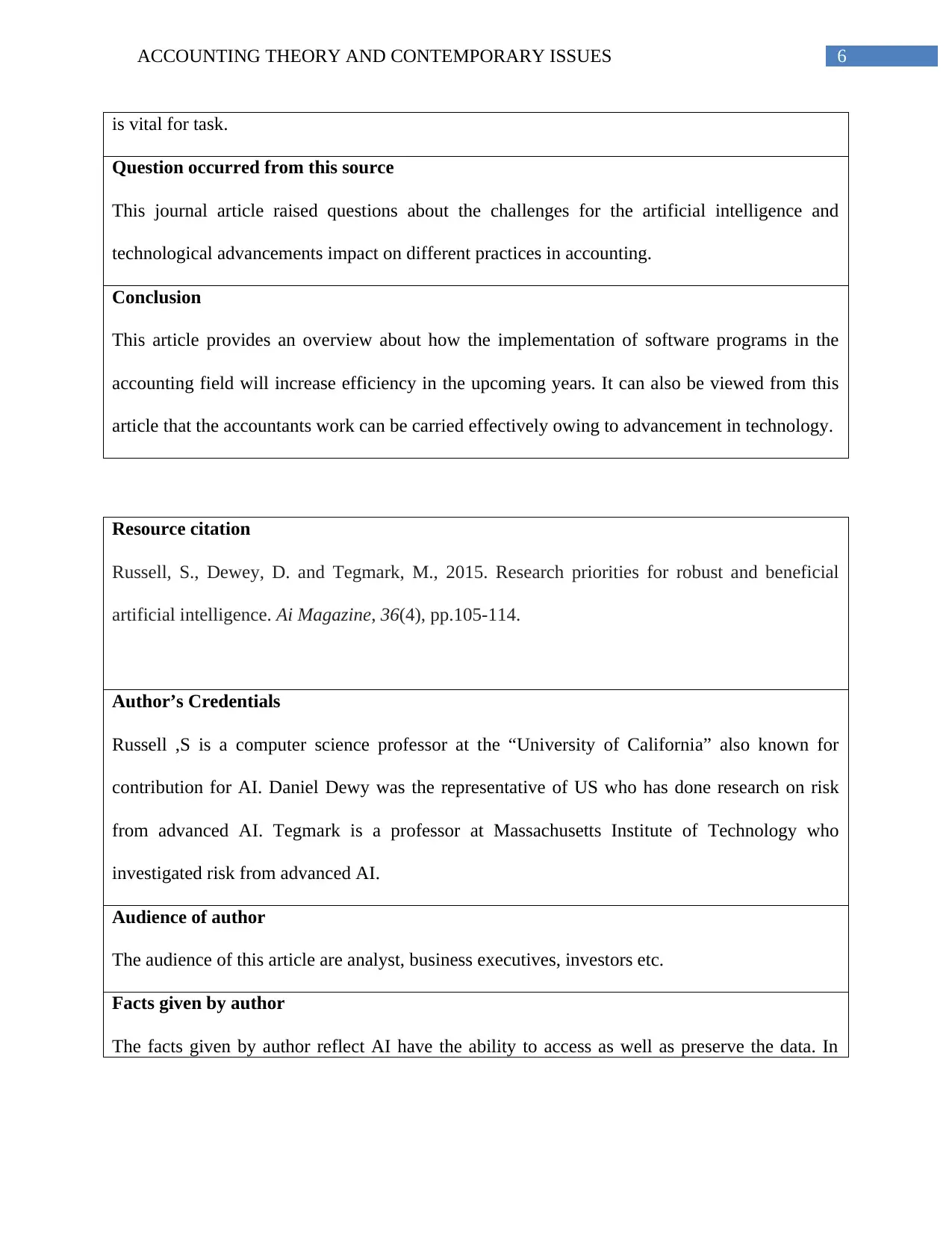
6ACCOUNTING THEORY AND CONTEMPORARY ISSUES
is vital for task.
Question occurred from this source
This journal article raised questions about the challenges for the artificial intelligence and
technological advancements impact on different practices in accounting.
Conclusion
This article provides an overview about how the implementation of software programs in the
accounting field will increase efficiency in the upcoming years. It can also be viewed from this
article that the accountants work can be carried effectively owing to advancement in technology.
Resource citation
Russell, S., Dewey, D. and Tegmark, M., 2015. Research priorities for robust and beneficial
artificial intelligence. Ai Magazine, 36(4), pp.105-114.
Author’s Credentials
Russell ,S is a computer science professor at the “University of California” also known for
contribution for AI. Daniel Dewy was the representative of US who has done research on risk
from advanced AI. Tegmark is a professor at Massachusetts Institute of Technology who
investigated risk from advanced AI.
Audience of author
The audience of this article are analyst, business executives, investors etc.
Facts given by author
The facts given by author reflect AI have the ability to access as well as preserve the data. In
is vital for task.
Question occurred from this source
This journal article raised questions about the challenges for the artificial intelligence and
technological advancements impact on different practices in accounting.
Conclusion
This article provides an overview about how the implementation of software programs in the
accounting field will increase efficiency in the upcoming years. It can also be viewed from this
article that the accountants work can be carried effectively owing to advancement in technology.
Resource citation
Russell, S., Dewey, D. and Tegmark, M., 2015. Research priorities for robust and beneficial
artificial intelligence. Ai Magazine, 36(4), pp.105-114.
Author’s Credentials
Russell ,S is a computer science professor at the “University of California” also known for
contribution for AI. Daniel Dewy was the representative of US who has done research on risk
from advanced AI. Tegmark is a professor at Massachusetts Institute of Technology who
investigated risk from advanced AI.
Audience of author
The audience of this article are analyst, business executives, investors etc.
Facts given by author
The facts given by author reflect AI have the ability to access as well as preserve the data. In
Paraphrase This Document
Need a fresh take? Get an instant paraphrase of this document with our AI Paraphraser
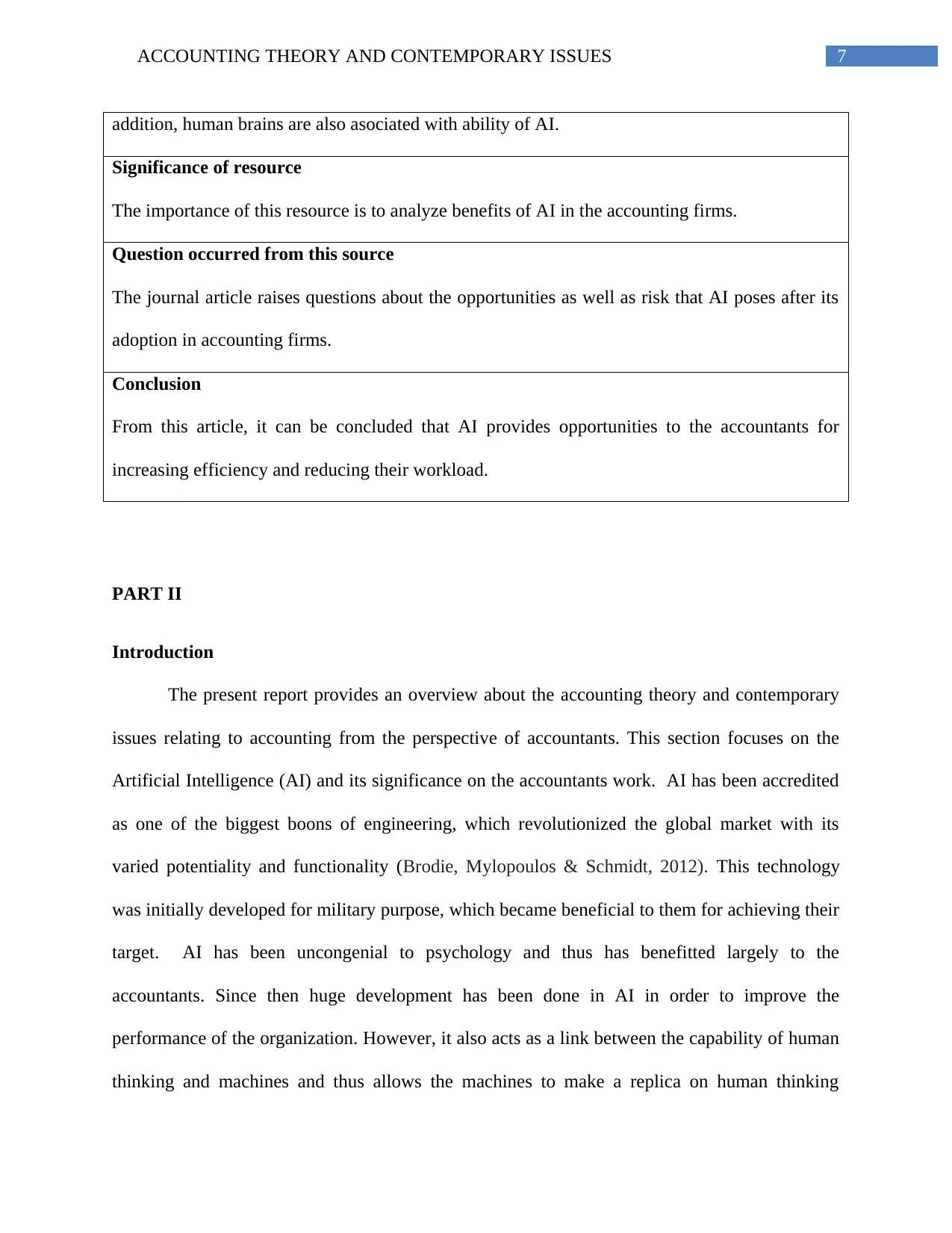
7ACCOUNTING THEORY AND CONTEMPORARY ISSUES
addition, human brains are also asociated with ability of AI.
Significance of resource
The importance of this resource is to analyze benefits of AI in the accounting firms.
Question occurred from this source
The journal article raises questions about the opportunities as well as risk that AI poses after its
adoption in accounting firms.
Conclusion
From this article, it can be concluded that AI provides opportunities to the accountants for
increasing efficiency and reducing their workload.
PART II
Introduction
The present report provides an overview about the accounting theory and contemporary
issues relating to accounting from the perspective of accountants. This section focuses on the
Artificial Intelligence (AI) and its significance on the accountants work. AI has been accredited
as one of the biggest boons of engineering, which revolutionized the global market with its
varied potentiality and functionality (Brodie, Mylopoulos & Schmidt, 2012). This technology
was initially developed for military purpose, which became beneficial to them for achieving their
target. AI has been uncongenial to psychology and thus has benefitted largely to the
accountants. Since then huge development has been done in AI in order to improve the
performance of the organization. However, it also acts as a link between the capability of human
thinking and machines and thus allows the machines to make a replica on human thinking
addition, human brains are also asociated with ability of AI.
Significance of resource
The importance of this resource is to analyze benefits of AI in the accounting firms.
Question occurred from this source
The journal article raises questions about the opportunities as well as risk that AI poses after its
adoption in accounting firms.
Conclusion
From this article, it can be concluded that AI provides opportunities to the accountants for
increasing efficiency and reducing their workload.
PART II
Introduction
The present report provides an overview about the accounting theory and contemporary
issues relating to accounting from the perspective of accountants. This section focuses on the
Artificial Intelligence (AI) and its significance on the accountants work. AI has been accredited
as one of the biggest boons of engineering, which revolutionized the global market with its
varied potentiality and functionality (Brodie, Mylopoulos & Schmidt, 2012). This technology
was initially developed for military purpose, which became beneficial to them for achieving their
target. AI has been uncongenial to psychology and thus has benefitted largely to the
accountants. Since then huge development has been done in AI in order to improve the
performance of the organization. However, it also acts as a link between the capability of human
thinking and machines and thus allows the machines to make a replica on human thinking
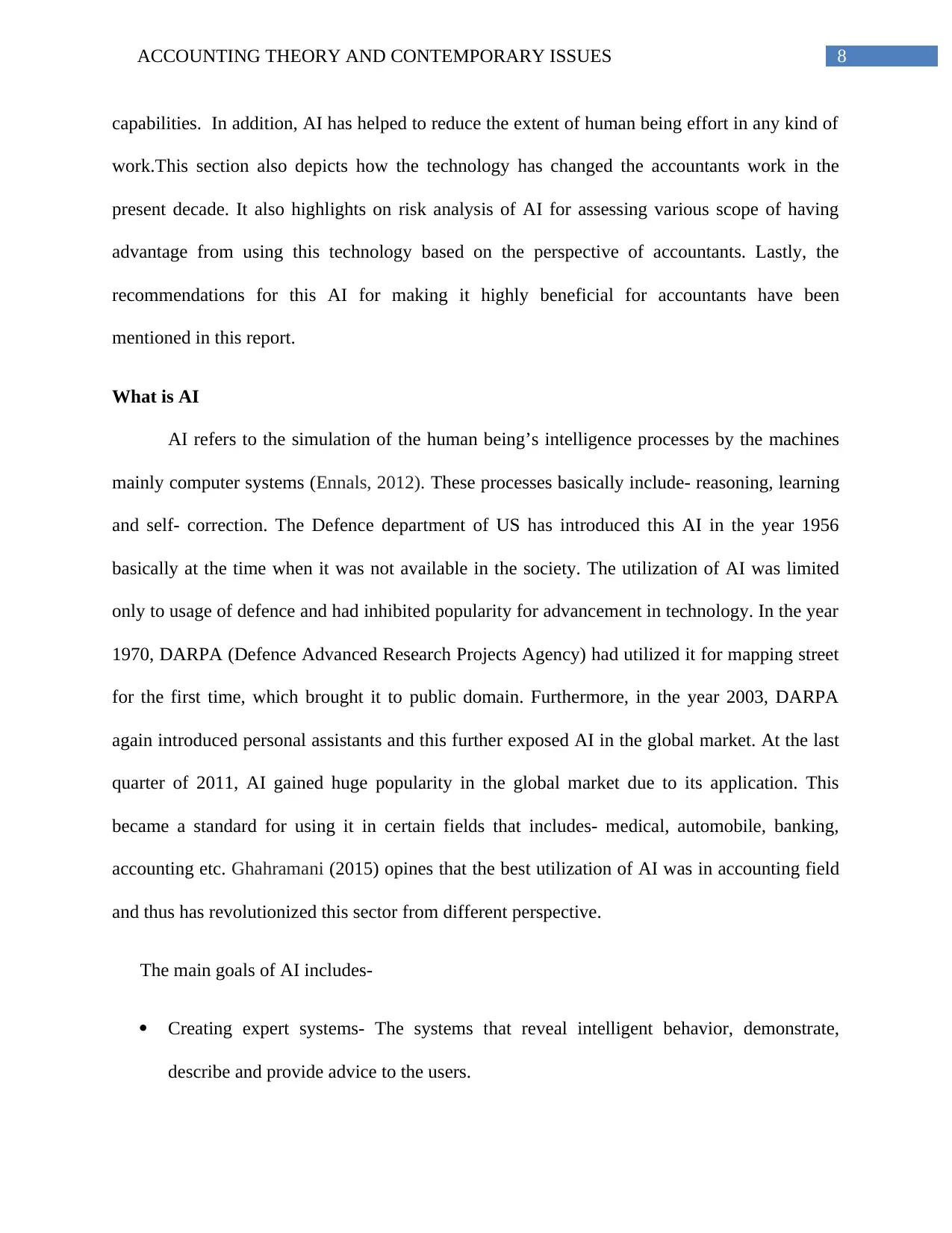
8ACCOUNTING THEORY AND CONTEMPORARY ISSUES
capabilities. In addition, AI has helped to reduce the extent of human being effort in any kind of
work.This section also depicts how the technology has changed the accountants work in the
present decade. It also highlights on risk analysis of AI for assessing various scope of having
advantage from using this technology based on the perspective of accountants. Lastly, the
recommendations for this AI for making it highly beneficial for accountants have been
mentioned in this report.
What is AI
AI refers to the simulation of the human being’s intelligence processes by the machines
mainly computer systems (Ennals, 2012). These processes basically include- reasoning, learning
and self- correction. The Defence department of US has introduced this AI in the year 1956
basically at the time when it was not available in the society. The utilization of AI was limited
only to usage of defence and had inhibited popularity for advancement in technology. In the year
1970, DARPA (Defence Advanced Research Projects Agency) had utilized it for mapping street
for the first time, which brought it to public domain. Furthermore, in the year 2003, DARPA
again introduced personal assistants and this further exposed AI in the global market. At the last
quarter of 2011, AI gained huge popularity in the global market due to its application. This
became a standard for using it in certain fields that includes- medical, automobile, banking,
accounting etc. Ghahramani (2015) opines that the best utilization of AI was in accounting field
and thus has revolutionized this sector from different perspective.
The main goals of AI includes-
Creating expert systems- The systems that reveal intelligent behavior, demonstrate,
describe and provide advice to the users.
capabilities. In addition, AI has helped to reduce the extent of human being effort in any kind of
work.This section also depicts how the technology has changed the accountants work in the
present decade. It also highlights on risk analysis of AI for assessing various scope of having
advantage from using this technology based on the perspective of accountants. Lastly, the
recommendations for this AI for making it highly beneficial for accountants have been
mentioned in this report.
What is AI
AI refers to the simulation of the human being’s intelligence processes by the machines
mainly computer systems (Ennals, 2012). These processes basically include- reasoning, learning
and self- correction. The Defence department of US has introduced this AI in the year 1956
basically at the time when it was not available in the society. The utilization of AI was limited
only to usage of defence and had inhibited popularity for advancement in technology. In the year
1970, DARPA (Defence Advanced Research Projects Agency) had utilized it for mapping street
for the first time, which brought it to public domain. Furthermore, in the year 2003, DARPA
again introduced personal assistants and this further exposed AI in the global market. At the last
quarter of 2011, AI gained huge popularity in the global market due to its application. This
became a standard for using it in certain fields that includes- medical, automobile, banking,
accounting etc. Ghahramani (2015) opines that the best utilization of AI was in accounting field
and thus has revolutionized this sector from different perspective.
The main goals of AI includes-
Creating expert systems- The systems that reveal intelligent behavior, demonstrate,
describe and provide advice to the users.
⊘ This is a preview!⊘
Do you want full access?
Subscribe today to unlock all pages.

Trusted by 1+ million students worldwide
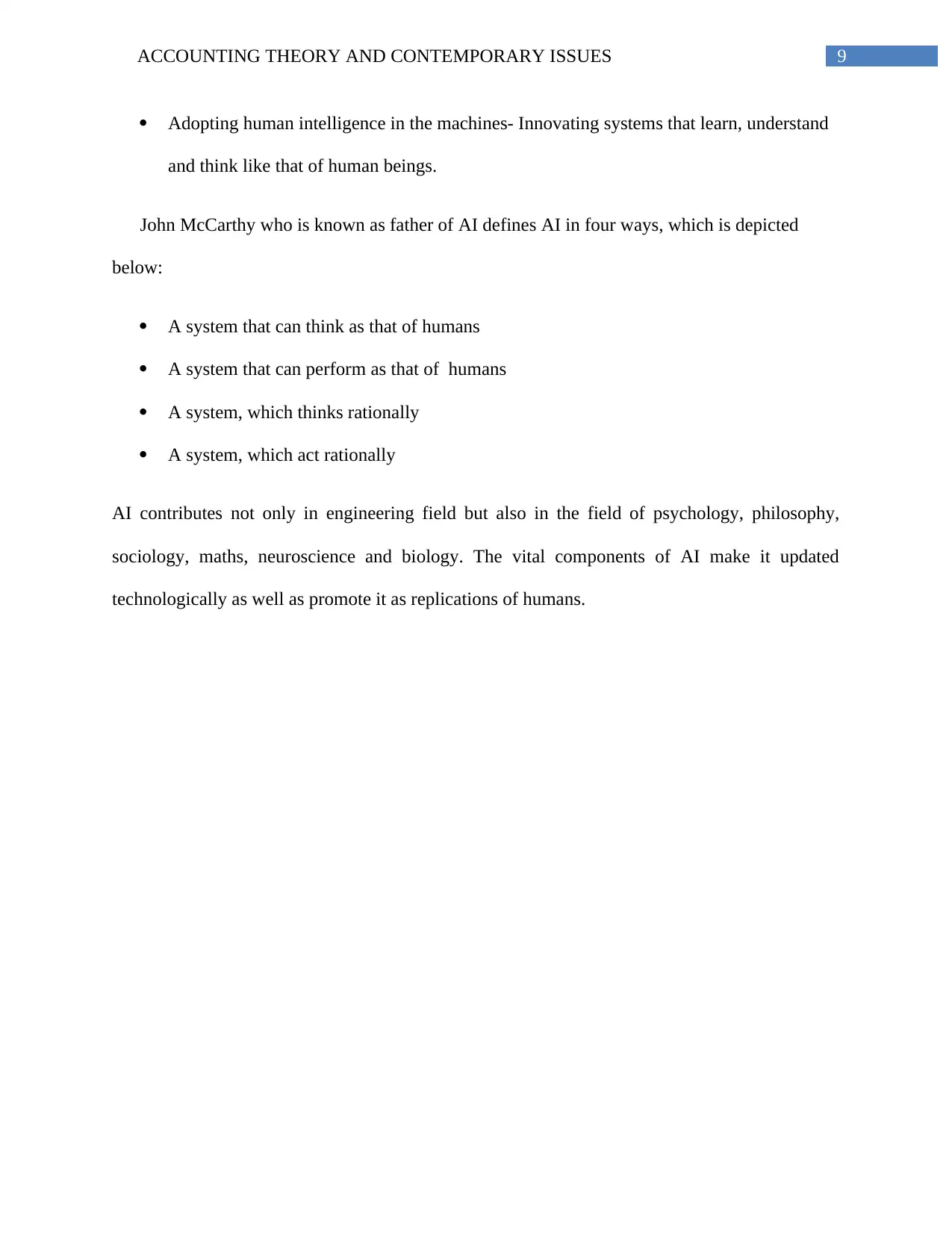
9ACCOUNTING THEORY AND CONTEMPORARY ISSUES
Adopting human intelligence in the machines- Innovating systems that learn, understand
and think like that of human beings.
John McCarthy who is known as father of AI defines AI in four ways, which is depicted
below:
A system that can think as that of humans
A system that can perform as that of humans
A system, which thinks rationally
A system, which act rationally
AI contributes not only in engineering field but also in the field of psychology, philosophy,
sociology, maths, neuroscience and biology. The vital components of AI make it updated
technologically as well as promote it as replications of humans.
Adopting human intelligence in the machines- Innovating systems that learn, understand
and think like that of human beings.
John McCarthy who is known as father of AI defines AI in four ways, which is depicted
below:
A system that can think as that of humans
A system that can perform as that of humans
A system, which thinks rationally
A system, which act rationally
AI contributes not only in engineering field but also in the field of psychology, philosophy,
sociology, maths, neuroscience and biology. The vital components of AI make it updated
technologically as well as promote it as replications of humans.
Paraphrase This Document
Need a fresh take? Get an instant paraphrase of this document with our AI Paraphraser
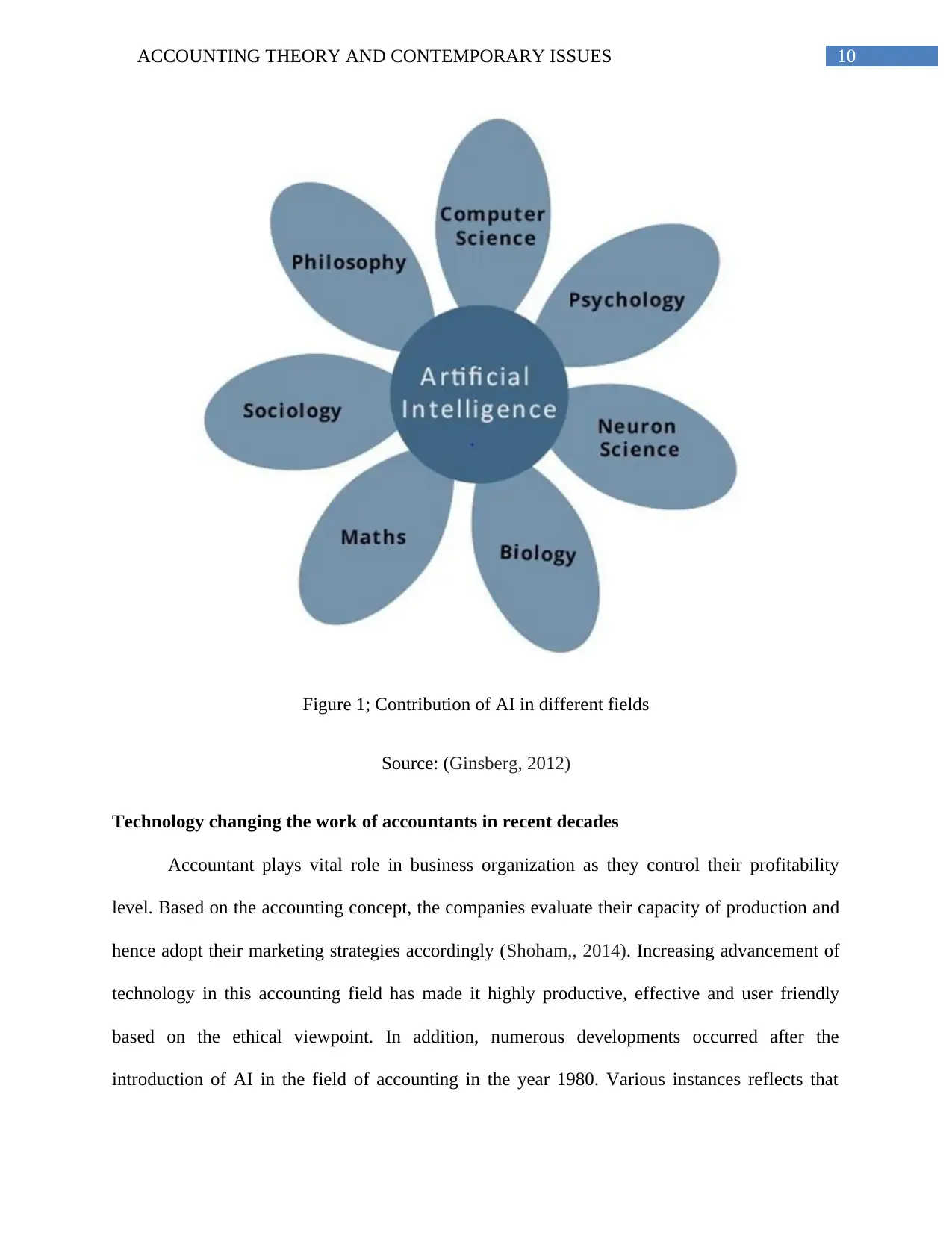
10ACCOUNTING THEORY AND CONTEMPORARY ISSUES
Figure 1; Contribution of AI in different fields
Source: (Ginsberg, 2012)
Technology changing the work of accountants in recent decades
Accountant plays vital role in business organization as they control their profitability
level. Based on the accounting concept, the companies evaluate their capacity of production and
hence adopt their marketing strategies accordingly (Shoham,, 2014). Increasing advancement of
technology in this accounting field has made it highly productive, effective and user friendly
based on the ethical viewpoint. In addition, numerous developments occurred after the
introduction of AI in the field of accounting in the year 1980. Various instances reflects that
Figure 1; Contribution of AI in different fields
Source: (Ginsberg, 2012)
Technology changing the work of accountants in recent decades
Accountant plays vital role in business organization as they control their profitability
level. Based on the accounting concept, the companies evaluate their capacity of production and
hence adopt their marketing strategies accordingly (Shoham,, 2014). Increasing advancement of
technology in this accounting field has made it highly productive, effective and user friendly
based on the ethical viewpoint. In addition, numerous developments occurred after the
introduction of AI in the field of accounting in the year 1980. Various instances reflects that
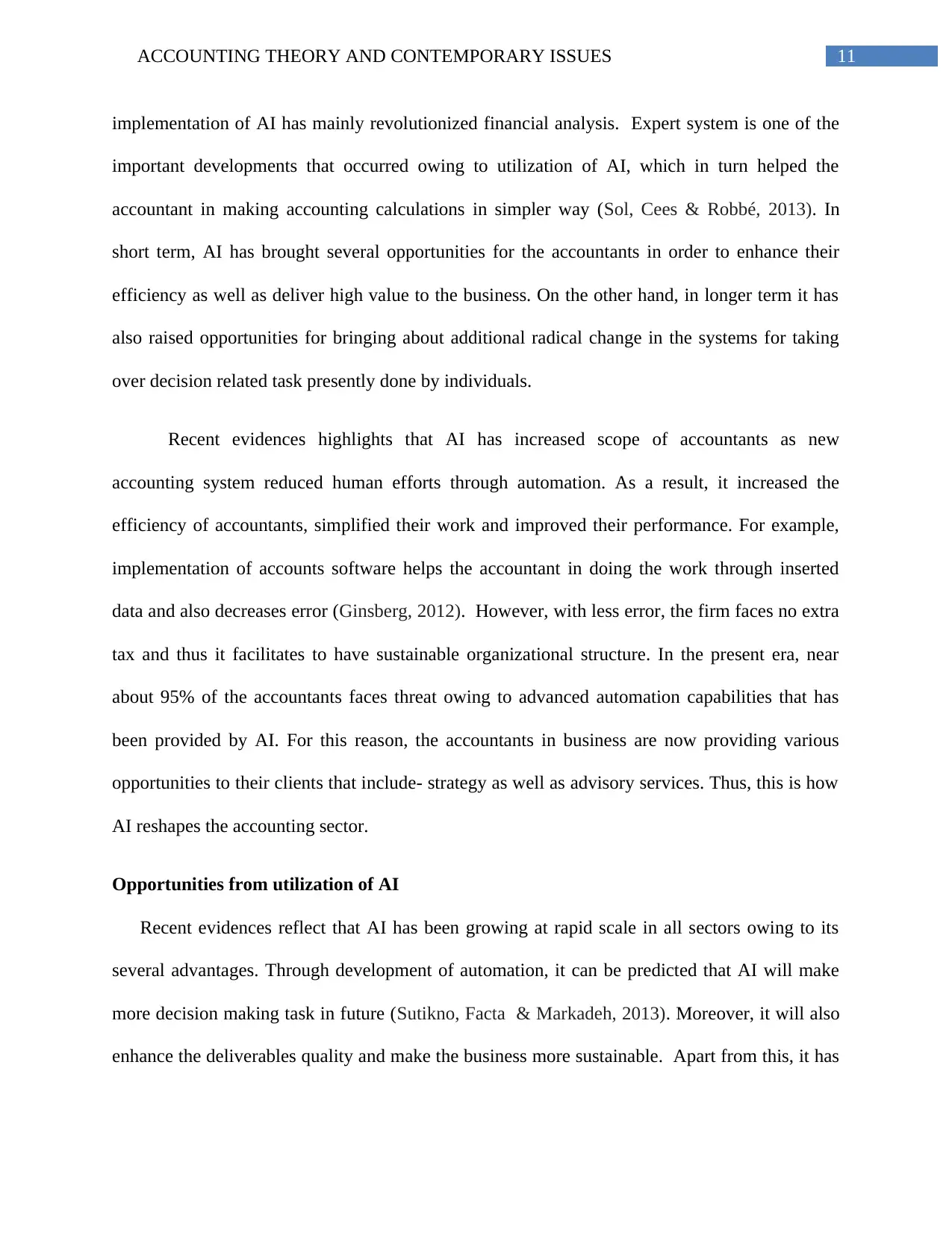
11ACCOUNTING THEORY AND CONTEMPORARY ISSUES
implementation of AI has mainly revolutionized financial analysis. Expert system is one of the
important developments that occurred owing to utilization of AI, which in turn helped the
accountant in making accounting calculations in simpler way (Sol, Cees & Robbé, 2013). In
short term, AI has brought several opportunities for the accountants in order to enhance their
efficiency as well as deliver high value to the business. On the other hand, in longer term it has
also raised opportunities for bringing about additional radical change in the systems for taking
over decision related task presently done by individuals.
Recent evidences highlights that AI has increased scope of accountants as new
accounting system reduced human efforts through automation. As a result, it increased the
efficiency of accountants, simplified their work and improved their performance. For example,
implementation of accounts software helps the accountant in doing the work through inserted
data and also decreases error (Ginsberg, 2012). However, with less error, the firm faces no extra
tax and thus it facilitates to have sustainable organizational structure. In the present era, near
about 95% of the accountants faces threat owing to advanced automation capabilities that has
been provided by AI. For this reason, the accountants in business are now providing various
opportunities to their clients that include- strategy as well as advisory services. Thus, this is how
AI reshapes the accounting sector.
Opportunities from utilization of AI
Recent evidences reflect that AI has been growing at rapid scale in all sectors owing to its
several advantages. Through development of automation, it can be predicted that AI will make
more decision making task in future (Sutikno, Facta & Markadeh, 2013). Moreover, it will also
enhance the deliverables quality and make the business more sustainable. Apart from this, it has
implementation of AI has mainly revolutionized financial analysis. Expert system is one of the
important developments that occurred owing to utilization of AI, which in turn helped the
accountant in making accounting calculations in simpler way (Sol, Cees & Robbé, 2013). In
short term, AI has brought several opportunities for the accountants in order to enhance their
efficiency as well as deliver high value to the business. On the other hand, in longer term it has
also raised opportunities for bringing about additional radical change in the systems for taking
over decision related task presently done by individuals.
Recent evidences highlights that AI has increased scope of accountants as new
accounting system reduced human efforts through automation. As a result, it increased the
efficiency of accountants, simplified their work and improved their performance. For example,
implementation of accounts software helps the accountant in doing the work through inserted
data and also decreases error (Ginsberg, 2012). However, with less error, the firm faces no extra
tax and thus it facilitates to have sustainable organizational structure. In the present era, near
about 95% of the accountants faces threat owing to advanced automation capabilities that has
been provided by AI. For this reason, the accountants in business are now providing various
opportunities to their clients that include- strategy as well as advisory services. Thus, this is how
AI reshapes the accounting sector.
Opportunities from utilization of AI
Recent evidences reflect that AI has been growing at rapid scale in all sectors owing to its
several advantages. Through development of automation, it can be predicted that AI will make
more decision making task in future (Sutikno, Facta & Markadeh, 2013). Moreover, it will also
enhance the deliverables quality and make the business more sustainable. Apart from this, it has
⊘ This is a preview!⊘
Do you want full access?
Subscribe today to unlock all pages.

Trusted by 1+ million students worldwide
1 out of 18
Related Documents
Your All-in-One AI-Powered Toolkit for Academic Success.
+13062052269
info@desklib.com
Available 24*7 on WhatsApp / Email
![[object Object]](/_next/static/media/star-bottom.7253800d.svg)
Unlock your academic potential
Copyright © 2020–2026 A2Z Services. All Rights Reserved. Developed and managed by ZUCOL.




![[University Name] Accounting Theory and AI Implementation Report](/_next/image/?url=https%3A%2F%2Fdesklib.com%2Fmedia%2Fimages%2Flw%2Fae210f4ce1684f0ea806ae996f6461fb.jpg&w=256&q=75)
